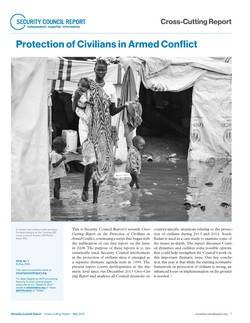 by Dan Dorrow
by Dan Dorrow
A May 2015 report on the protection of civilians in armed conflicts concludes that the existing normative framework is quite strong but more work is needed toward on-the-ground implementation. The report comes from Security Council Report, “an independent not-for-profit organisation … founded on the belief that consistent, balanced, high-quality information about the activities of the UN Security Council and its subordinate bodies is essential to the effective performance of the Council and that this information should also be available to a wider group of stakeholders and the general public.”
Highlights from the report:
Since 2013, protection language has been included or expanded in nearly all country-specific decisions. The Council’s decisions continue to support robust peacekeeping to protect civilians. The Council’s increasing protection challenge since 2014 has been atrocities committed against civilians by terrorist groups like ISIS and Boko Haram. The report recommends stronger interactions between field-level personnel and Council members, who need a better understanding of civilian protection challenges to come up with more informed strategies.
The report features a case study on South Sudan, where the picture is mixed. The Council did act to protect civilians when civil war erupted in December 2013. The effect was limited, however, because the speed and decisiveness of its actions were suboptimal. Presently, signs are not encouraging: fighting continues, civilians are suffering enormously, and the Council is not unified on how to deal with the conflict.
Salient points from the South Sudan case study include:
Since December 2013, the humanitarian situation has significantly deteriorated; the Council calls it a “catastrophe.”
Food and water shortages are rife. Access to health services is limited at best. The Council is calling for better humanitarian access amidst the fighting.
Intra-Council political divisions are impeding efforts to enhance accountability via the International Criminal Court.
The parties to the civil war seem to have little appetite to make concessions toward peace. The mediation process is faltering.
To the Council’s credit, the UN mission’s troop and police ceilings were raised and the mandate was narrowed to focus specifically on civilian protection.
Learn more about the Presbyterian Church (U.S.A.)’s partners in South Sudan.